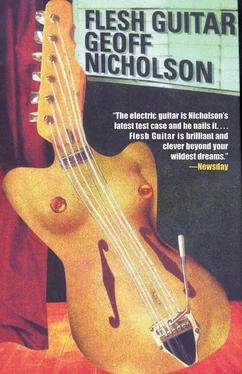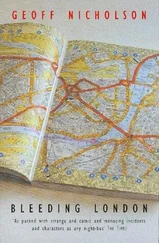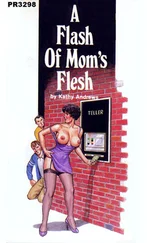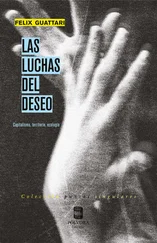Their nearest neighbour lived at least a quarter of a mile away, which was fortunate in one sense. There was nobody to bang on the walls or call the police. On the other hand it meant that Beth was totally alone in her ordeal. The cleaning woman came, listened to Jon playing the drums, seemed appreciative and told Beth she thought this was a terribly good sign. But she only had to live with it for an hour a day and Beth suspected that what she really appreciated was the fact that she didn’t have to clean the living room.
Beth, needless to say, did occasionally ask her husband to stop playing; at bedtime for instance, at mealtimes, when she wanted to watch something on television. Jon didn’t say no. He didn’t argue or defy her. He simply failed to communicate with her at all, and carried on drumming. Of course she got angry with him. Of course she shouted at him, but it did no good. He acted as though he hadn’t heard and, in truth, when his drumming hit a particularly loud patch, she could barely hear herself.
Every moment of Beth’s life was now filled with the sound of her husband’s drumming. Her every move and thought was accompanied by cymbal crashes, flams, rolls, paradiddles, ruffs, rim shots. Some moments were quieter than others. There were times when he played with brushes, or tapped out extraordinarily complex figures solely on the ride cymbal. Occasionally he’d sit with a tambourine in one hand and a shaker in the other, and spend twenty or thirty minutes exploring their tonal and rhythmic possibilities. But he never completely stopped playing, and Beth knew that these moments of comparative peace would invariably resolve themselves into louder, more aggressive, truly intolerable bursts of percussion.
At first she thought he must eventually wear himself out. She thought he would either run out of ideas or stop because of simple physical exhaustion. It was true that he did sleep sometimes, either on the stool, as on that first night, or on the couch in the corner of the room. But these naps were short, infrequent, taken at peculiar times of the day, and he would wake suddenly, perfectly refreshed and begin playing with renewed vigour and vehemence.
When Beth started to feel positively suicidal she called the one person she hoped might be able to help. But Sting was still busy and she had to fall back on Jenny Slade. She called her and begged her for help. Jenny turned up at the house the next day with her guitar, a couple of pedals and a small tube amp, and after a long talk with Beth she went into the room where Jon Churchill was still playing and she set up her equipment.
If Jon recognized Jenny from the old days he certainly did nothing to indicate the fact. Indeed her presence in the room seemed to be a matter of complete indifference to him. He showed neither interest nor surprise and when Jenny cranked her guitar into life and began to play along with him, he looked as though he was completely oblivious to the noise she was making. And yet something was happening. After half an hour or so the music began to gel. He was not making any concessions to her guitar playing, but gradually the dynamics of the music changed. Soon she was no longer just playing along with him; they were definitely playing together.
There were some rough edges, moments when they lost each other, but there was no doubt that a terrific interaction was taking place. A strange and complex piece of music was coming into being there in the living room of this Suffolk beach house. After two hours had passed, two hours of the most intense, intricate, draining invention on Jenny’s part, she needed a rest. She unhooked her guitar, turned off the amp, but Jon went right on playing.
Beth and Jenny walked along the straight shingle beach together, far enough away from the house so that they could no longer hear the drumming.
‘Oh well,’ said Beth, ‘it was a nice try. I thought a face from the old days might bring him back to normal. Shame it didn’t work.’
‘What are you talking about?’ Jenny replied. ‘It worked beautifully. Jon and I are going to create a lot of beautiful music before we’re finished. Maybe it’ll be his last gasp, maybe it won’t quite work, but I think we’re going to have a great work of art on our hands.’
‘But how can it be art?’ Beth demanded. ‘Art demands consciousness, discrimination, a guiding personality. Poor Jon doesn’t have any of those things. He’s just playing through sheer instinct. I don’t think he has a clue what he’s doing.’
‘Maybe not,’ Jenny agreed. ‘But I do, and it would be criminal to let it just slip away. I’ll have a mobile recording van here as soon as humanly possible. I don’t want to miss a single beat more than I have to.’
Beth shook her head sadly. This was not what she’d had in mind at all, and yet she couldn’t deny that Jenny Slade was probably doing the right thing. Perhaps her husband’s music did deserve preserving and recording, but that didn’t help her to find it any less intolerable.
Jenny made a couple of phone calls before returning for another two-hour session with Jon that night. Beth sat on the grass in the garden, pulling the heads off dandelions. As well as her husband’s drumming she now had to contend with a hundred decibels of distorted guitar noise. She got little sleep that night, but at least she was awake next morning when the mobile studio arrived in her front garden and youths with shaved heads began laying cables all around the house.
Jon Churchill drummed on oblivious to the mikes and screens that were being set up around him. He was of no use to anyone in helping to create a good drum sound, but neither did he hinder or object to what they were doing. When the engineers were happy with the balance, they miked Jenny into the board and the recordings began. These tapes, which were later to be dubbed The Dementia Sessions, are generally agreed to be some of the most intense, most extreme drum and guitar duets ever recorded.
Jenny Slade and Jon Churchill played together with only the most perfunctory breaks and interruptions for the best part of seventy-two hours. Jenny stopped once in a while to retune or to modify her guitar tone, and to replace the occasional broken string, but Jon just kept playing through the gaps.
There was certainly a development as the days progressed. The music of the first day was taut and disciplined in a way that would seem staid compared with the later stuff. The music, without ever losing its focus, became increasingly loose, free form, untrammelled. It became wilder and more Dionysian as it went on, but it never sounded chaotic, never lost its way or its sense of itself. Certain passages were remarkably simple and lyrical, just a simple four-note guitar melody played against a repeated drum pattern. At other times both players displayed a breathtaking, bravura virtuosity.
Later Bob Arnold would write, ‘Few people have been lucky enough to hear the entire session from beginning to end, but those who have are stunned by the work’s essential unity and coherence. Rhythms and chord progressions that are quickly passed over in the early hours of the session are reworked and given full expression some twenty or thirty hours later. The three-CD set that was extracted from the tapes represents a distillation but also an enormous reduction. The complete work derives its strength and majesty from its sheer size and scale, and in a perfect world it would always be listened to as a whole.’
Given the way the recording was set up, it inevitably started in medias res, at the moment when the engineers happened to be ready, and the ending was similarly abrupt and arbitrary. After three days of continuous playing, Jenny was more than ready to call it quits. It was only Jon Churchill’s relentless energy, her fear of letting him down, and her sense that she was part of something so very important that had kept her going for so long.
Читать дальше












